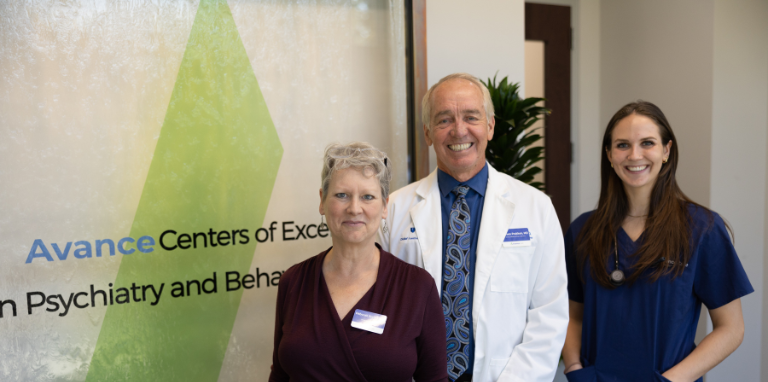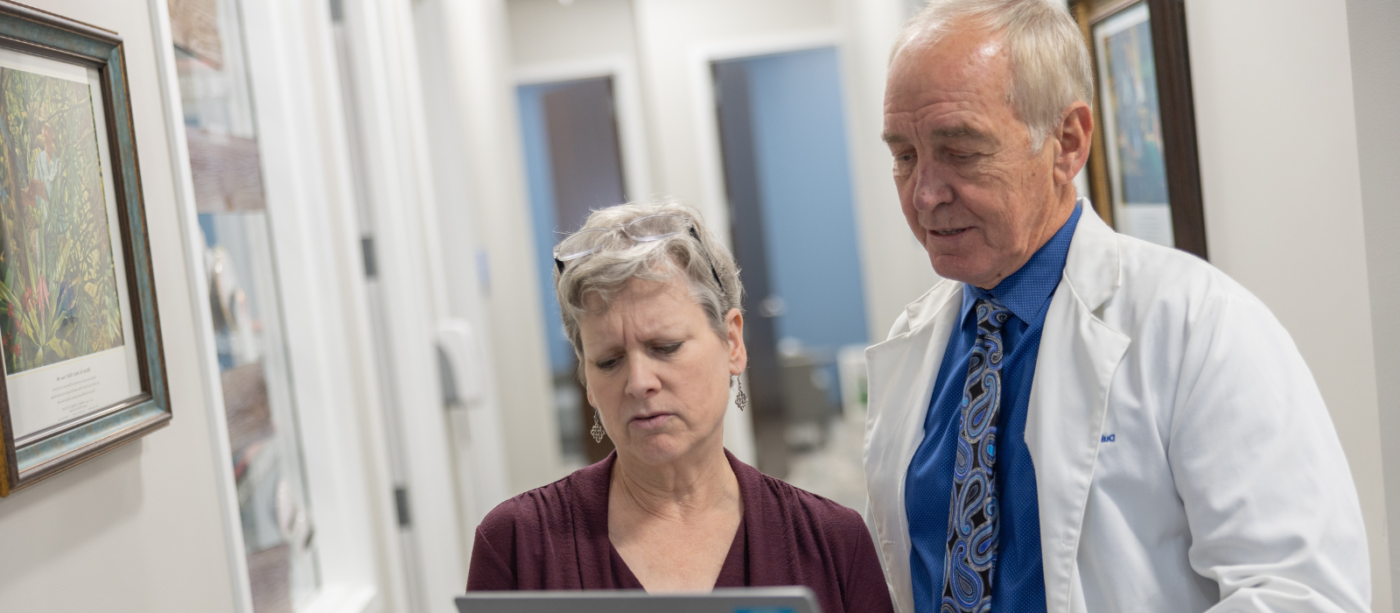
Avance Medical Pain
Chronic pain is said to be the most challenging condition in medicine. Though incredibly common (20% of US population currently diagnosed, up to 40% will be at some point in their life) each case is uniquely difficult. Chronic pain can arise from injuries, surgeries, neurological diseases, medications, or even infections (e.g. post-covid). Most patients with chronic pain also struggle with anxiety and/or depression.
The Medical Pain Service team within Avance Psychiatry makes it easier to find relief. Our clinical team – led by Dr. Steven Prakken, a nationally recognized pain expert – is dedicated to providing our patients with effective treatment for chronic pain.
Personalized Care for Chronic Pain
The complex origins of pain are confusing for patients and practitioners alike, and the secondary emotional issues it causes (depression, anxiety, substance use) may cause shame and secrecy. With fewer practitioners treating pain, it is difficult to find one with the multidisciplinary training to address this combination of symptoms, leaving chronic pain patients with limited treatment resources.
Many people with chronic pain try a variety of medications or injection therapies with steroids or numbing agents. These are helpful for some people. But sometimes, the pain continues to cause significant disruptions in the ability to sleep, work, or to lead a fulfilling life.
Using a patient-centered, functional pharmacology approach, the Avance Medical Pain Service team treats chronic pain patients with an expanded array of medications that optimize pain relief and mental health and wellness. We welcome patients who have complex, difficult-to-treat pain conditions who feel they have hit a dead-end in treatment elsewhere.
We work within a ‘shared decision making’ model, where collaboration with patients and their families is paramount. Through this functional pharmacology approach, we carefully review all of the medications a person is taking to ensure that they are getting the most pain relief with the fewest side effects. We also ensure that they are safe and are not taking a higher dosage or more medications than they need to.
Our goal is your optimal function, within your unique limits and abilities, done safely.
Avance Pain Management is located in Avance Psychiatry and Pain Management in Chapel Hill, North Carolina.
We accept most major insurance plans and self-pay patients.
Ketamine for Chronic Pain and Depression
Avance Psychiatry’s Medical Pain Service is one of a few, select pain clinics in North Carolina that offer ketamine infusions, a cutting-edge therapy for the treatment of pain and depression. If you’ve already tried a variety of treatments for pain or depression with little success, ketamine infusion therapy may be an option to help you feel better.
Ketamine has long been used as an anesthetic. More recently, lower doses of ketamine given intravenously (via IV) has been shown to alleviate symptoms of severe depression and pain.
Pharmacologic Treatment
Psychopharmacological Pain Management
Our unique staff, trained in both psychiatry and pain management, are well positioned to treat the complex combination of symptoms common to chronic pain. Using a Functional Pharmacology approach, we systematically analyze the effects and side-effects of all medications, working collaboratively to find the correct, yet smallest, combination of medications that are optimal for your individual situation.
Frequently Asked Questions
- Do you use opioids in pain treatment?
We believe that opioids continue to have a place in the treatment of chronic pain, but not as the first choice. If other treatments have been unsuccessful, then a trial of opioids is considered. The goal of opioid treatment is to successfully increase function, not just provide pain relief. - I am already on opioids. Is that a problem for your clinic?
No. Many of our new patients are already on opioids. If you are on opioids, we will evaluate your underlying pain condition and try to stabilize you on your current dose unless it appears to be unsafe. Then we will make a collaborative decision about future treatment. We are guided by function and safety, not “one size fits all” dose level. - What types of pain do you treat?
We treat all types of chronic pain. This includes common pain conditions like joint, neck and back pain, migraine, neuropathies, and fibromyalgia. We also specialize in less common syndromes such as complex regional pain syndrome, central pain, post covid pain and multi-trauma pain. We collaborate with other specialists to treat pain related to rheumatologic, gastrointestinal, pulmonary, or cardiac disease, in addition to cancer pain. - Do your treatments for pain include anything other than medication?
Yes. Though our primary focus is medication management, we also utilize Botox injections for headache, and trigger point injections for musculoskeletal and joint pain. In some cases, we use ketamine infusions. We refer in-clinic to our behavioral health practitioners for non-medical pain treatment modalities such as Cognitive Behavioral Therapy, mindfulness meditation, etc. - Do you think pain is all ‘psychiatric’ or in a person’s head?
No. Depression, anxiety, and other psychiatric conditions commonly co-exist with pain conditions but are not the reason someone has chronic pain. Chronic pain tends to cause depression and anxiety, and we treat those conditions at the same time we treat the underlying pain condition. - Do people get “cured” of chronic pain?
It depends. The vast majority of pain patients get 30-50% pain relief. We strive to obtain the best pain control possible, while ensuring that mood and other physical and emotional symptoms are aggressively treated, permitting a feeling that life is satisfying even though some pain continues. - Do you prescribe opioids on the first visit?
No. As a general rule we will not give opioids to someone on the first visit, even if they are currently taking them as prescribed by another practitioner. We must do an initial evaluation, including a drug screen, before we give opioids. - Do you provide ketamine treatment?
Yes, in a select few cases we treat pain by giving ketamine as an infusion or nasally. - Do you treat post operative pain?
Yes. We manage pain at any stage, including pre and post-surgery. Research has shown that recovery is optimized if pain control is well managed before and after surgery. If you are concerned about post-surgical pain, we can work with your surgeon to co-manage it. - Is your treatment mostly psychiatric?
No. We manage pain and all its complications. All the Medical Pain Service practitioners are trained in treating both pain and psychiatric conditions, which commonly co-occur. If necessary, we will refer you to a psychotherapist; we are focused on medical management of your pain and treat psychiatric issues that arise at the same time.



